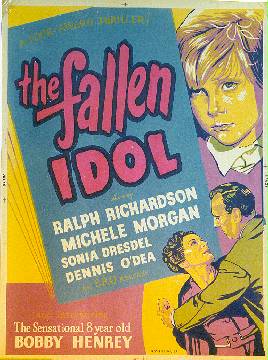
Last night I saw Carol Reed and Graham Greene's The Fallen Idol, from 1948, rescued from its place on afternoon television and mounted on a cinema screen. Up there, the staircase that is so pivotal to the plot looks properly vast, as it would do to the put-upon and sincere young hero Philipe (the stunning, then-9-year-old Bobby Henrey). Up there, the chequered floor in the French Embassy resembles a giant chess board, as it must, with the characters literally shifting this way and that across the squares as the dynamics keep changing.
The images sing. The dialogue can pinch: "It's a good life," says Baines (Ralph Richardson) , "if you don't weaken."
And there are some incidental touches that have an earthy authenticity - the domestics discussing casually the details of how Mrs Baines must have died when she hit the bottom step, whether her neck snapped "like a twig", whether there was any blood. And the prostitute, Rose (Dora Bryan, probably best known for her later role as Rita Tushingham's brassy mother in A Taste of Honey), who upon learning that Philipe is the Ambassador's son, trills: "Oooh, I know your daddy!", leaving us to join the dots.
Even more so than The Third Man, the Reed/Greene collaboration which has overshadowed unfairly The Fallen Idol for so long, there is a resounding sense of hurt and injustice in the film. Philipe is pressured from all sides by adults seeking his silent collusion in their awful secrets, until he literally doesn't know which way to turn when the police are interviewing him about the involvement of his beloved Baines in the death of Mrs Baines. The corpse in the film is by-the-by; this is really about the psychological violence we inflict on children by asking them to participate in our knotted emotional transactions.
When I watched it, I thought again of something my dad said to me when I was about 10 or 11. He said that when he was driving home from work, he sometimes debated making a left turn instead of a right, and just driving and driving and not coming home. And this from someone who would describe himself as a family man. Then I think of all the things that children hear, overhear or are forced to process with their limited capabilities, and I feel sick.
This is a masterful film: suspenseful, but always sad and wise. I guess Philipe had to toughen up as he grew older, and this was the start of that. As he descends the staircase to meet his mother in the final shot, his playful prance has been replaced by a kind of stately bob. He's changed.

0 Comments:
Post a Comment
<< Home